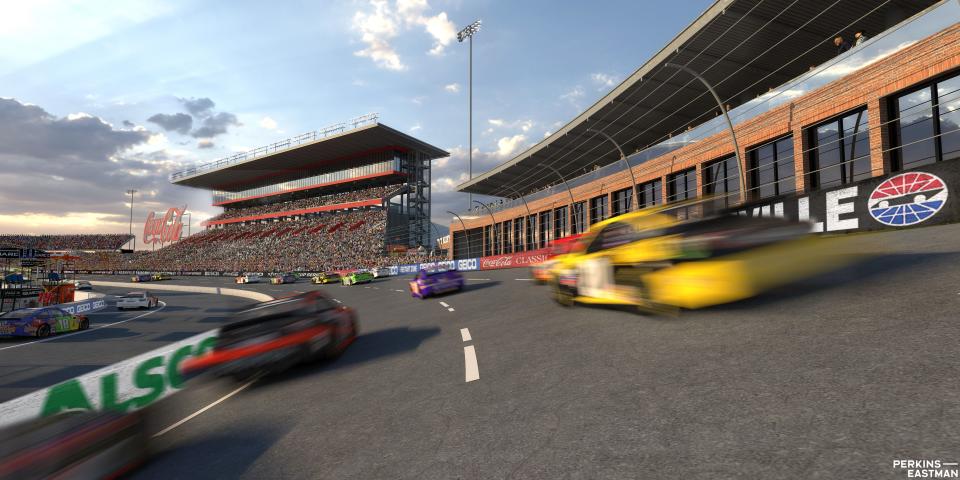Hurdles lie ahead in Bristol Motor Speedway deal to bring NASCAR back to Nashville
Nashville Mayor John Cooper has agreed in principle to Bristol Motor Speedway's proposal to bring NASCAR back to Nashville Fairgrounds Speedway.
The agreement isn't final, but could lay groundwork for a future contract between Metro and Bristol Motor Speedway. Any final deal requires approval from the Board of Fair Commissioners and Metro Council.
The company separately acquired the Nashville Superspeedway near Lebanon in November.
The city estimates track renovations, including steps to mitigate noise, will cost around $75 million. If ultimately approved, the renovated racetrack would become part of a sprawling 117-acre development including mixed-use buildings, the new 30,000-seat Nashville SC soccer stadium and Fair Park.
Cooper's administration released some details of the preliminary agreement on Nov. 30, similar to details discussed in earlier proposals and a letter of intent inked in March. Here's what we know.
The road ahead
The deal has many hurdles to clear before becoming final.
Cooper initially said he hoped the next NASCAR race could take place at the Nashville Fairgrounds Speedway in 2022, but now says the target date is 2024.
First, the deal must be declared "sound" by an independent sports finance consultant (it is currently under review).

Before Cooper's office can present the deal to the fair board, the board's two open seats must be filled.
One seat has sat empty for several months after Cooper failed to make a timely appointment and Metro Council voted down two of Vice Mayor Jim Shulman's picks. The other seat, recently vacated, awaits an appointment from Cooper.
Both said they anticipate appointments — which must also receive Metro Council approval — to be made "sooner rather than later."
If the fair board approves the deal, it will be submitted to the Metro Sports Authority and Metro Council for approval.
More: What Cup champion Kyle Larson said about NASCAR returning to Nashville Fairgrounds Speedway
Any demolition on the property will require approval from 27 Metro Council members or an amendment to the city's charter, thanks to a charter provision added in 2011 to protect the site.
Early iterations of the plan, which BMS has pursued for several mayoral administrations, included razing the current grandstand to build a 30,000-seat grandstand in its place.
In 2018, Metro Council voted 31-8 to demolish some buildings and structures at the fairgrounds as part of the greatly-debated plan to build the $275 million MLS stadium.
Financing, noise controls
Under the current proposal, BMS would lease, manage and operate the Metro-owned Fairgrounds Speedway for 30 years.
The speedway's $75 million renovation would be financed by 30-year revenue bonds issued by the Metro Sports Authority. The bonds would be paid through the speedway's revenue streams once the renovations are complete, including rent payments, user fees and taxes paid by patrons, sponsorship agreements and event revenue.
Renovations include:
Modernizing the track to meet NASCAR series standards
Outfitting the speedway for use as a multi-purpose venue
Constructing a 20-foot sound-absorbing wall, new buildings and overhauling the grandstands
The plans require securing "guaranteed maximum price" construction contracts, meaning contractors would be responsible for any construction cost overruns.
Residents in nearby neighborhoods have repeatedly expressed skepticism that the plan will alleviate noise and traffic issues already present without NASCAR events.
BMS said it would also mandate muffler use for non-NASCAR racing events, reduce track practice rentals to 20 days per year and limit other race weekends.
A report by international acoustics engineering firm Wrightson Johnson Haddon & Williams estimates the noise mitigation strategies proposed by BMS will reduce perceived loudness by 50%.
BMS also says it has developed partnerships with five fairgrounds-area nonprofits, but details of these partnerships have yet to be announced.
Reach reporter Cassandra Stephenson at ckstephenson@tennessean.com or at (731) 694-7261. Follow Cassandra on Twitter at @CStephenson731.
This article originally appeared on Nashville Tennessean: Nashville mayor inches toward Bristol Motor Speedway deal: What to know

